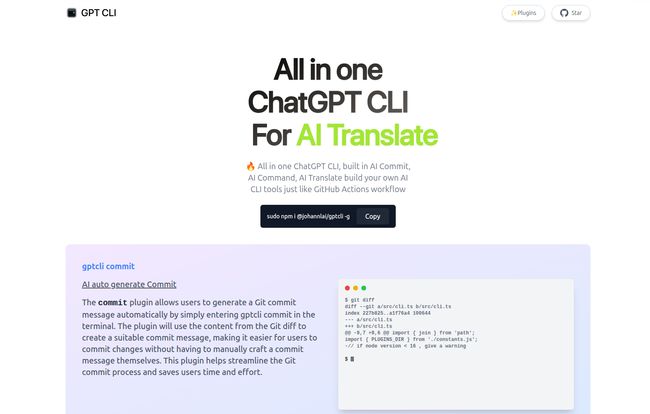As developers, or really anyone who spends a significant amount of time staring at a terminal's blinking cursor, we've all been there. You're deep in the zone, coding away, and then... you hit a wall. Not a coding wall, but a process wall. What was that git command to squash the last three commits? How do I find all files larger than 5MB modified in the last week? You know it's possible, but the exact syntax escapes you. So begins the ritualistic dance of opening a new browser tab and frantically searching Stack Overflow.
It breaks your flow. It’s annoying. It’s just… friction.
For years, we've accepted this as part of the job. But with the explosion of AI in practically every corner of our lives, I've been waiting for something to come along and smooth out these little bumps in the developer experience. And I think I might have just stumbled upon it. It’s called GPT CLI, and it’s one of those wonderfully simple ideas that makes you wonder, “Why didn’t I think of that?”
So What Exactly is GPT CLI?
In the simplest terms, GPT CLI is a tool that lets you talk to your command line in plain English. Think of it as a personal translator standing between your brain and your shell (like bash or zsh). Instead of having to be fluent in the arcane dialect of shell commands, you can just state your intent, and GPT CLI, powered by ChatGPT, figures out the rest.
It takes your natural language instructions and converts them into the structured commands the machine needs. But it's more than just a one-trick pony; it’s a framework for building your very own AI-powered command-line tools. And that’s where things get really interesting.
The Killer Features That Hooked Me
While the potential is broad, a couple of its out-of-the-box plugins immediately caught my eye. These aren't just novelties; they solve real, everyday annoyances.
Finally, Meaningful Git Commit Messages
I'm going to be vulnerable here. I have a history of writing truly terrible git commit messages. I'm talking about classics like "fix bug," "wip," and the ever-descriptive "stuff." We've all done it, don't lie. When you're in a hurry, writing a detailed, conventional commit message feels like a chore.
This is where the `gptcli commit` plugin shines. You just run the command, and it analyzes your staged changes (the `git diff`) and automatically generates a clear, well-formatted commit message for you. It's like having a hyper-organized version of yourself who actually enjoys documentation do the boring part. This is a massive win for team collaboration and for your future self who will thank you for not having to decipher what "tweaks" meant six months ago.
Speaking Your Mind Directly to the Terminal
The other feature that feels like a slice of the future is `gptcli command`. This is the natural language translator I was talking about. You can literally just describe what you want to do.
For example, instead of trying to remember the flags for `find` or `ls`, you can just type:
$ gptcli command 'js files in the folder'And it will suggest and execute the correct command to list all the JavaScript files in your current directory. It's a small thing, but the cumulative time and mental energy saved from not having to context-switch to a browser is huge. This is what technology should do—get out of the way and let you focus on the real problem.

Visit GPT CLI
A Whole World of AI Plugins
The fun doesn't stop with commits and commands. The platform is built around a plugin architecture, and it comes with a few other neat tools that demonstrate its flexibility. There are plugins for quick translations (`AI Translate`), checking the weather (`AI Weather`), adding standardized emojis to your commits (`AI gitmoji CZ`), and even integrating with Notion and Whisper for transcription. It turns your command line from a simple tool into a multi-purpose AI-powered swiss army knife. A pretty cool evolution for the humble terminal, if you ask me.
Getting Your Hands Dirty with GPT CLI
If you're intrigued, getting started is straightforward, provided you're comfortable in a developer's environment. It's an npm package, so the installation is a one-liner:
sudo npm i @johannlai/gptcli -g
Of course, this brings me to an important point. This tool is built by developers, for developers (or at least, for power users). You'll need to have Node.js and npm installed on your system, and you should be comfortable with the idea of working in a command-line interface. If you live in GUIs and the sight of a terminal gives you hives, this probably isn't for you. And thats okay!
The Honest Truth: Is It All Perfect?
I’m an optimist, but also a realist. No tool is perfect, and GPT CLI is no exception. Let's break down the good and the not-so-good.
What I Genuinely Like
The speed and efficiency gains are real. The natural language interface for commands feels like magic, and the AI-generated commits have genuinely improved my git history. It's lightweight, fast, and does what it says on the tin. I also love that it's open source, which means a community can build around it and improve it over time.
A Few Caveats to Consider
First, the dependency on Node.js might be a turn-off for some. Second, and more importantly, the quality of the output is only as good as the underlying AI model. If ChatGPT has a weird day, your results might be… creative. You still need to be the human in the loop, sanity-checking the commands it suggests before you blindly execute them—especially if it suggests something like `rm -rf /`!
Some purists might also argue that using a tool like this is a crutch that prevents you from learning the actual commands. I get that perspective, I really do. But I see it differently. I see it as an accelerator. It’s not about not knowing the commands; it's about reducing cognitive load and saving time. I know how to do long division, but I still use a calculator. This feels the same.
So, What's the Price Tag?
This is often the million-dollar question. But in this case, the answer is a pleasant surprise. GPT CLI is an open-source project. It's free. Free! You can check out the source code, report issues, and even contribute yourself over on its GitHub page. The only potential cost is for the OpenAI API usage, as you'll need to provide your own API key for it to work, but for the kind of light usage this tool encourages, the cost is likely to be negligible for most people.
My Final Take as a Terminal Junkie
So, is GPT CLI a gimmick or a game-changer? In my book, it's a genuinely useful tool that points toward the future of developer interfaces. It doesn't try to replace the command line; it enhances it. It makes it more accessible, more powerful, and frankly, a little more fun.
It won't write your code for you, but it will handle some of the most tedious bits of workflow admin, freeing you up to do the work that actually matters. And for that reason alone, it's earned a permanent place in my developer toolkit. Give it a shot; you might be surprised how much you like talking to your computer.
Frequently Asked Questions
- Do I need to pay for GPT CLI?
- The tool itself is free and open-source. However, it requires an API key from OpenAI to function. Depending on your usage of the OpenAI API, you may incur very small costs, but for most individual developers, it will likely fall within the free tier or be extremely cheap.
- Is GPT CLI hard to install?
- If you're a developer with Node.js and npm already installed, it's incredibly easy—just a single command. If you're not familiar with Node.js or the command line, there will be a small learning curve to get the environment set up first.
- How is this different from GitHub Copilot CLI?
- That's a great question. Both tools bring AI to the terminal, but they have different focuses. GitHub Copilot CLI is more focused on explaining commands and suggesting them with its `??` and `ghcs` aliases. GPT CLI, on the other hand, is built as a more general-purpose framework that not only suggests commands but also has specific plugins for tasks like generating commit messages and is designed to let you easily build your own AI commands.
- Can I create my own custom plugins for GPT CLI?
- Yes, and that's one of its most powerful features! The platform is designed to be extensible. If you have a repetitive task you'd like to automate with AI, you can build your own plugin for it. The documentation on their GitHub provides guidance on how to do this.
- Do I have to review the commands it generates?
- Absolutely. 100%. You should always treat AI-generated code or commands as a suggestion from a very smart, but sometimes mistaken, assistant. Always review what it's about to do before hitting enter, especially for commands that could delete or modify files.
Reference and Sources
- GPT CLI Official GitHub Repository: https://github.com/johannlai/gpt-cli
- Node.js Official Website: https://nodejs.org/



